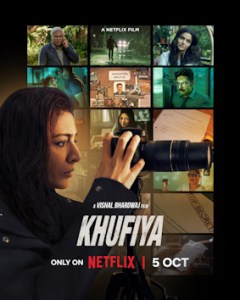Watch Khufiya on Netflix
Buy Escape to Nowhere at Amazon
Filmmaker Vishal Bhardwaj is gifted at adapting plays and books into killer screenplays, from his Shakespeare trilogy (Maqbool, Omkara, and Haider) to 7 Khoon Maaf, based on the Ruskin Bond short story “Susanna’s Seven Husbands.” His latest — Khufiya — is based on Amar Bhushan’s espionage novel Escape to Nowhere, but the resulting film is not one of Bhardwaj’s most successful adaptations.
Khufiya‘s setup is pretty straightforward. It’s 2004, and a mole within India’s intelligence bureau RAW leaked information that got one of their operatives killed. RAW needs to find out who the mole is working with and how they’re transferring sensitive documents.
In the years since the 1999 Kargil War, both India and Pakistan worked in secret to influence elections in Bangladesh. It’s there that an Indian operative named Heena (Bangladeshi actress Azmeri Haque Badhon) is murdered at a swanky party while trying to poison Pakistani Brigadier Mirza (Shataf Figar).
RAW officer Jeev (Ashish Vidyarthi) quickly and correctly identifies an employee named Ravi (Ali Fazal) as the source of the leak. Jeev lets his most trusted deputy Krishna (Tabu) lead the operation to follow Ravi as a way of getting payback for Heena’s death. Though they may not have publicly acknowledged it, it’s clear that Krishna’s partnership with Heena was more than just professional.
The spy stuff is fun, as Krishna’s crew bugs Ravi’s house with hidden cameras and follow him around town. There’s some suspicion that Ravi’s wife Charu (Wamiqa Gabbi) is helping him transfer documents, but she mostly hangs out at home smoking weed and dancing to old film songs in her underwear.
When they finally discover who Ravi’s working for, the truth reveals a web of global geopolitics that is more complicated than India versus Pakistan, spy versus spy. The second half of the film switches the focus from Krishna and India to another character in another location, similar to Gone Girl.
Khufiya‘s two standout performers are Badhon as Heena and Gabbi as Charu. Badhon is ideal as a sexy vamp. Gabbi is sassy and adorable as Charu when she thinks no one is watching her and heartbreaking when the consequences of Ravi’s double-dealing come to bear. Fazal is totally solid as Ravi.
Tabu’s Krishna is stoic as she puts her pain on the back-burner to focus on the mission at hand. Despite Krishna being the main character, we don’t get to know her as well as I wanted to, and Tabu doesn’t get to show the emotional range she’s capable of.
That’s because the screenplay isn’t a great adaptation of the novel. The movie feels very much like it was based on a book, with lots of subplots, complex international relations, and character introspection. There’s so much going on that Bhardwaj would’ve been better either turning Khufiya into a series or cutting some subplots out of the final draft.
Making Khufiya into a series would have allowed more time to showcase all the subplots — particularly Krishna’s relationship with Heena — while enabling more in-depth character development and opportunities to establish atmosphere. The midpoint character point of view switch also would have felt more organic. As it stands, the movie feels simultaneously too dense and not dense enough.
If Bhardwaj was set on shooting Khufiya as a film, it would’ve been fair to axe Krishna’s ex-husband Shashank (played by Atul Kulkarni) and their teenage son Vikram (Meet Vohra) from the plot. As is, they seem like afterthoughts who don’t add enough to Krishna’s arc. The only reason to keep them is that it gives Bhardwaj an excuse to work a couple of Shakespeare references into the story, with Vikram starring in a production of Julius Caesar and having a Tempest poster hanging on his bedroom wall.
The music is terrific, as it is in every Bhardwaj picture (he’s also the film’s composer). Singer Rahul Ram plays a holy man, and his songs “Bujhee Bujhee” and “Mann Na Rangaave” are soundtrack highlights.
Khufiya is by no means bad. It just could have been better.
Links
- Khufiya at Wikipedia
- Khufiya at IMDb
- My review of Omkara
- My review of 7 Khoon Maaf
- My review of Haider
[Disclaimer: my Amazon links include an affiliate tag, and I may earn a commission on purchases made via those links. Thanks for helping to support this website!]
